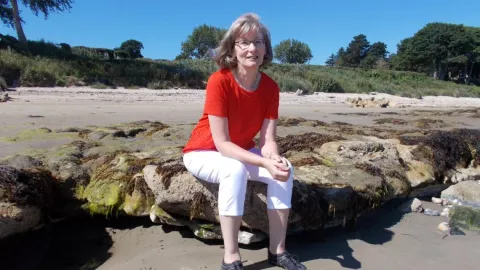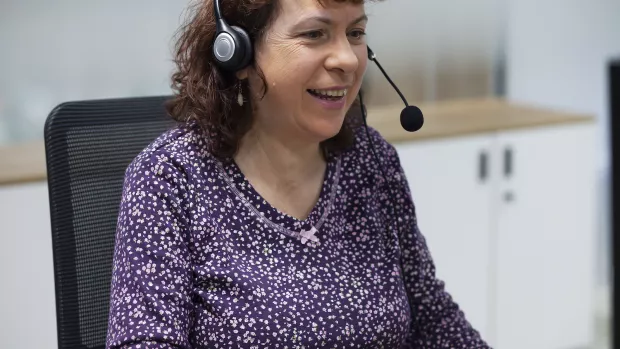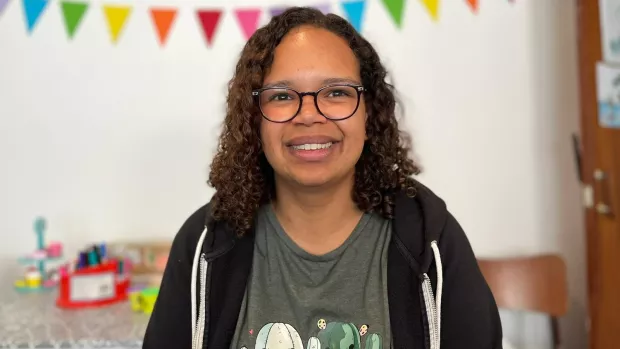
Helen's MS Helpline story
When Helen joined the MS Helpline eleven years ago, she never imagined how much a part of her life it would become. And how much she would gain from providing support to others.
How it all began
I applied to volunteer on the MS Helpline after coming across the opportunity quite by accident. I was looking on behalf of someone else but the requirements of this role seemed to suit my own skillset.
I remember taking my first calls so vividly. I was concerned I might be asked something I had no idea how to answer, but it was fine. I’d been well prepared by weeks of thorough training and assessment from the staff team. The low-level nervous excitement I felt that day is actually something that’s important to retain. We never know what the next call will bring!
Never an average shift
Within a three-hour shift, I might take anything from two or three long calls to a dozen really short ones. Callers won’t be aware whether they’re speaking with a staff member or a volunteer, as their experience will be the same.
There’s no such thing as an average shift. When you’d expect a day to be busy, it isn’t. When you assume calls will all be about some recent research headlines, they aren’t. I’ve learned not to assume anything. We receive calls on EVERYTHING. We really do. Callers are looking for information or emotional support or, very often, both. We’re not required to know the answer to every question, but we must know where to look or how to proceed.
Training as a Helpline Volunteer is ongoing. There’s always more to learn and it’s important that we continually refresh our knowledge and skills. Information changes quickly in the world of MS and we must always be up to date and accurate.
Feeling valued as part of the team
The staff are wonderfully skilled at treating us as their peers, and our ideas and feedback are welcomed. We’re genuinely appreciated for what we do, and I have what I consider real friends among the team.
There’s also flexibility if we need to adjust our role in any way. Like lots of my fellow volunteers, I have MS. From time to time, I need to work around the fluctuations of my condition (and life!) I’m always encouraged to do what’s best for me. As a result, I feel very loyal to the MS Helpline.
Changes across the years
Looking back, I think the nature of calls has changed due to the growing availability of the internet. Callers are better informed now. But, with so much information out there, they often rely on us to separate myths from facts and signpost them to reliable sources.
When I started, there were fewer than half a dozen Disease Modifying Therapies (DMTs). It was amazing to be able to share that information with callers who had no idea they existed.
Many callers were also unaware that there were MS Specialist Nurses around the UK, and were astonished and relieved to find this out. These days, I can refer them to our own MS Specialist Nurses within the MS Helpline Service - we’ve diversified brilliantly over the years!
Read more about our MS Helpline Nurses
Sadly, calls about disability benefits haven’t got any easier. Our community have found it increasingly difficult to navigate the complexities of the system, especially since the introduction of PIP. But we do now have great resources to share with callers on this. And we have a Benefits Advisor as part of the team.
We of course never anticipated the COVID-19 pandemic, and how busy we would be. But we became a ‘go to’ resource for trusted information at a time of great anxiety, when guidance was rapidly changing.
And, as lockdown isolated people who were already vulnerable, many of them reached out to the Helpline – so we rapidly set up a new Befriending service to respond to this need.
Self-care is important
To do this role, we need to be open and honest about the impact it can have on us. We take calls that can be hugely challenging. People can be highly emotional or very angry. But we have clear service boundaries and many support systems in place. If I’ve been on a difficult call, I’ll usually take a break straight after and then call colleagues to chat it through.
I’m lucky to live near the sea and can, most days, walk to the shore. I find outdoor space very healing and strolling on the beach is hugely therapeutic. Alternatively, just relaxing on the sofa with my rescue cat and a cup of tea can work wonders after a demanding shift.
Here’s to another eleven years!
There’s always been a sense of pride in saying I’m an MS Helpline Volunteer. I’m proud to be part of something much bigger than myself, which has ultra-high standards and wins awards. I also feel highly valued by callers who express gratitude for the call. It's a fabulous feeling to end a shift knowing my time was well spent and callers have gone away with whatever they needed from dialling in that day.
It’s a bit odd to realise I’m now one of the longest-serving volunteers on the MS Helpline. But I love how our team is rejuvenated with new recruits. Everyone gets a warm welcome and we’re all considered equal – regardless of length of service.
The MS Helpline is so much a part of my life now that I can’t imagine not being a part of it.




